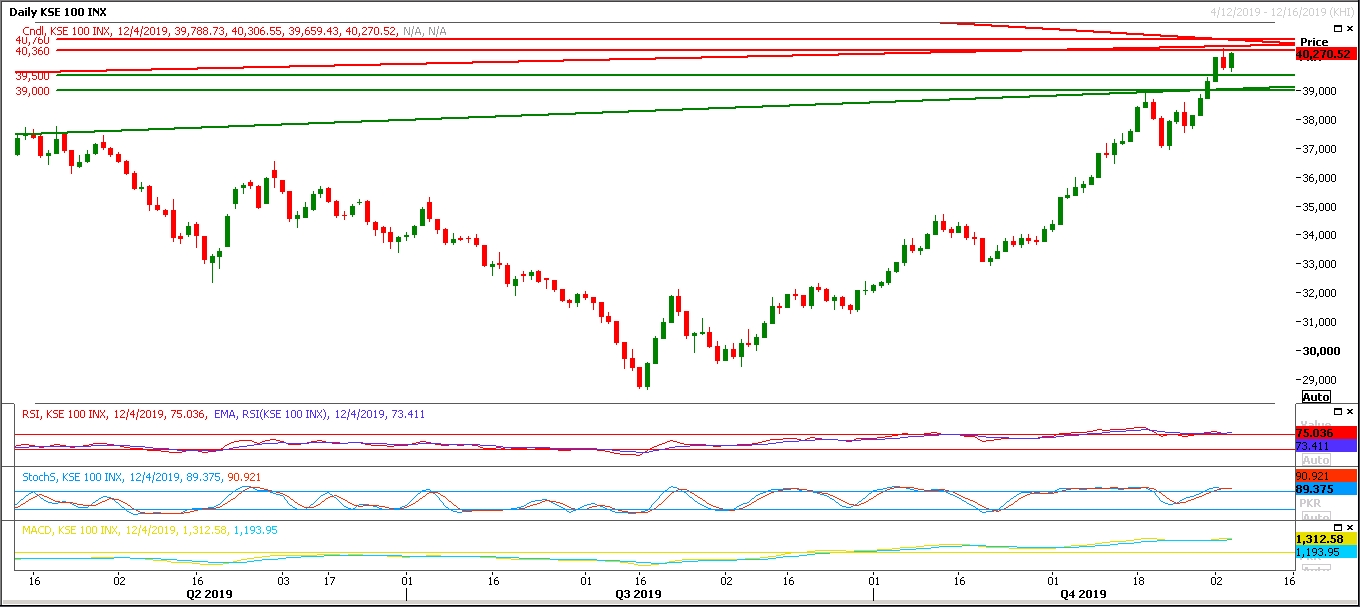Previous Session Recap
Trading volume at PSX floor dropped by 55.73 million shares or 12.41% on DoD basis, whereas the benchmark KSE100 index opened at 39,788.73, posted a day high of 40,306.55 and a day low of 39,659.43 points during last trading session while session suspended at 40,270.52 points with net change of 481.79 points and net trading volume of 240.10 million shares. Daily trading volume of KSE100 listed companies dropped by 46.67 million shares or 16.27% on DoD basis.
Foreign Investors remained in net selling positions of 7.73 million shares and net value of Foreign Inflow dropped by 1.93 million US Dollars. Categorically, Foreign Individual and Corporate remained in net selling positions of 0.13 and 8.35 million shares but Overseas Pakistanis Investors remained in net buying positions of 0.75 million shares. While on the other side Local Individuals, Mutual Fund and Brokers remained in net buying positions of 31.96, 2.14 and 10.19 million shares but Local Companies, Banks, NBFCs and Insurance Companies remained in net selling positions of 7.03, 18.96, 8.31 and 1.79 million shares respectively.
Analytical Review
Asian stocks inch up on trade outlook but markets remain wary
Asian stocks edged up on Thursday on signs the United States and China were on track for a preliminary trade deal, though optimism was tempered by the almost daily shifts in prospects for defusing the damaging tariff war now in its second year.The fluid situation around Sino-U.S. trade negotiations has cast a pall on financial markets heading into Christmas, with major economies grappling under the weight of weak exports, investments and corporate profits. Investors were quick to latch on to a Bloomberg report on Wednesday that Washington and Beijing are closer to agreeing how many tariffs would be rolled back in a “phase one” trade deal. U.S. President Donald Trump later said that negotiations with China are going “very well,” providing a boost to riskier assets and denting safe havens like the Japanese yen. MSCI's broadest index of Asia-Pacific shares outside Japan .MIAPJ0000PUS rose 0.3%. Australian shares were up 0.9%, while Japan's Nikkei stock index .N225 rose 0.81%.
Cement exports jump 21pc in July-November
Domestic cement sales during 5MFY20 rose by three per cent to 16.854 million tonnes while exports grew by 21.5pc to 3.608m tonnes. As a result, the overall cement despatches grew by 5.76pc to 20.462m tonnes. On the other hand, in November, domestic sales rose by 5.11pc to 3.538m tonnes while exports swelled by 44pc to 0.808m tonnes. Overall cement despatches went up by 10.6pc to 4.346m tonnes. Domestic consumption in the northern region amounted to 2.976m tonnes while 0.264m tonnes of cement were exported whereas in the southern region, the consumption stood at 0.562m tonnes and exports at 0.544m tonnes during November. Cement consumption in the northern region rose by 11.32pc to 14.432m tonnes during the five months compared to same period last fiscal year. The region exported 1.214m tonnes during the same period, down 3pc compared to last year.
Inflation surges to nine-year high
Inflation rose to 12.7 per cent year-on-year, the highest level in nine years mainly driven by an increase in prices of food items, the Pakistan Bureau of Statistics (PBS) reported on Wednesday. Inflation, measured by the Consumer Price Index (CPI), edged up by 1.3pc over the previous month after the PBS revised its calculation methodology by setting the new base year 2015-16 instead of the previous 2007-08 financial year. Finance ministry in a brief statement claimed that inflation would come down from the next month without saying how they figured this. The data released on Wednesday shows that higher prices of food items have been the largest driver in overall inflation in November. It has also been observed that the prices of essential food items are higher in rural areas than in urban areas.
Govt to sell unused state properties at Dubai Expo
The federal government has decided to sell its precious unutilised state properties at the Dubai Expo to attract foreign and Pakistani investors to the country and the funds generated through the exercise will be spent on public welfare schemes related to education, health, food and housing. It was decided at a meeting on abandoned state properties held at the Prime Minister Office on Wednesday. The meeting was presided over by Prime Minister Imran Khan. “These unutilised state properties will be marketed at the Dubai Expo to attract foreign and Pakistani investors to buy these assets,” Privatisation Secretary Rizwan Malik informed the prime minister during the meeting. The prime minister directed the authorities concerned to sell all precious abandoned properties of the state and to spend the money to be fetched from their sale on welfare of the masses.
‘Microfinance key to tackling poverty’
Finance Adviser Dr Abdul Hafeez Shaikh on Wednesday said the government was committed to increasing production capacity of microfinance sector to grab maximum benefits out of minimum resources. Addressing a two-day microfinance conference here, the adviser said that stable economy was pivotal for promotion of the sector, which has been made possible due to timely and effective measures by the government. He said the unprivileged segment of society could be brought out of extreme poverty by promoting microfinance. Shaikh pointed out that due to huge fiscal deficits in the past, provision of loans to the private sector got affected. However, fiscal deficit during the first five months of this fiscal year not only went down as, but also entered surplus zone if interest payments were not taken into account.
Asian stocks edged up on Thursday on signs the United States and China were on track for a preliminary trade deal, though optimism was tempered by the almost daily shifts in prospects for defusing the damaging tariff war now in its second year.The fluid situation around Sino-U.S. trade negotiations has cast a pall on financial markets heading into Christmas, with major economies grappling under the weight of weak exports, investments and corporate profits. Investors were quick to latch on to a Bloomberg report on Wednesday that Washington and Beijing are closer to agreeing how many tariffs would be rolled back in a “phase one” trade deal. U.S. President Donald Trump later said that negotiations with China are going “very well,” providing a boost to riskier assets and denting safe havens like the Japanese yen. MSCI's broadest index of Asia-Pacific shares outside Japan .MIAPJ0000PUS rose 0.3%. Australian shares were up 0.9%, while Japan's Nikkei stock index .N225 rose 0.81%.
Domestic cement sales during 5MFY20 rose by three per cent to 16.854 million tonnes while exports grew by 21.5pc to 3.608m tonnes. As a result, the overall cement despatches grew by 5.76pc to 20.462m tonnes. On the other hand, in November, domestic sales rose by 5.11pc to 3.538m tonnes while exports swelled by 44pc to 0.808m tonnes. Overall cement despatches went up by 10.6pc to 4.346m tonnes. Domestic consumption in the northern region amounted to 2.976m tonnes while 0.264m tonnes of cement were exported whereas in the southern region, the consumption stood at 0.562m tonnes and exports at 0.544m tonnes during November. Cement consumption in the northern region rose by 11.32pc to 14.432m tonnes during the five months compared to same period last fiscal year. The region exported 1.214m tonnes during the same period, down 3pc compared to last year.
Inflation rose to 12.7 per cent year-on-year, the highest level in nine years mainly driven by an increase in prices of food items, the Pakistan Bureau of Statistics (PBS) reported on Wednesday. Inflation, measured by the Consumer Price Index (CPI), edged up by 1.3pc over the previous month after the PBS revised its calculation methodology by setting the new base year 2015-16 instead of the previous 2007-08 financial year. Finance ministry in a brief statement claimed that inflation would come down from the next month without saying how they figured this. The data released on Wednesday shows that higher prices of food items have been the largest driver in overall inflation in November. It has also been observed that the prices of essential food items are higher in rural areas than in urban areas.
The federal government has decided to sell its precious unutilised state properties at the Dubai Expo to attract foreign and Pakistani investors to the country and the funds generated through the exercise will be spent on public welfare schemes related to education, health, food and housing. It was decided at a meeting on abandoned state properties held at the Prime Minister Office on Wednesday. The meeting was presided over by Prime Minister Imran Khan. “These unutilised state properties will be marketed at the Dubai Expo to attract foreign and Pakistani investors to buy these assets,” Privatisation Secretary Rizwan Malik informed the prime minister during the meeting. The prime minister directed the authorities concerned to sell all precious abandoned properties of the state and to spend the money to be fetched from their sale on welfare of the masses.
Finance Adviser Dr Abdul Hafeez Shaikh on Wednesday said the government was committed to increasing production capacity of microfinance sector to grab maximum benefits out of minimum resources. Addressing a two-day microfinance conference here, the adviser said that stable economy was pivotal for promotion of the sector, which has been made possible due to timely and effective measures by the government. He said the unprivileged segment of society could be brought out of extreme poverty by promoting microfinance. Shaikh pointed out that due to huge fiscal deficits in the past, provision of loans to the private sector got affected. However, fiscal deficit during the first five months of this fiscal year not only went down as, but also entered surplus zone if interest payments were not taken into account.
Market is expected to remain volatile during current trading session.
Technical Analysis
The Benchmark KSE100 index have major resistant regions ahead at 40,400 points and 40,760 points where its being capped by two descending trend lines on daily and weekly charts. Daily and weekly momentum indicators are also not in bullish mode and these are showing exhausting mode therefore it's expected that index would try to bounce back after an intraday spike and its recommended to stay cautious and post trailing stop losses on existing long positions. Because if index would face rejection today from 40,400-40500 points region then its bearish rally would start initially for a correction. While on flip side index have supportive regions at 39,860 points and 39,500 points. Breakout below 39,500 points would confirm start of a bearish regime
 To Open picture in original resolution right click image and then click open image in a new tab
To Open picture in original resolution right click image and then click open image in a new tab


0 Comments
No comments yet. Be the first to comment!
Please log in to leave a comment.